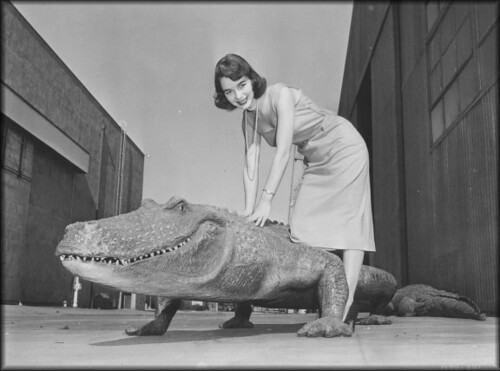Flickr set of the week is Old Disneyland by Tom Simpson: “Pictures from its construction and first few years of operation.”
Tag: USA
I’ve just finished Monkey Girl by Edward Humes, an account of the Kitzmiller v. Dover Area School District court case about the constitutionality of teaching Intelligent Design in biology lessons. I was slightly underwhelmed by the book—you can read my review here—but the subject is interesting. How do you manage science education in a country where so many believe that the mainstream scientific orthodoxy is not just false but offensive and morally suspect?

If you have to resort to the court system and the separation of church and state to keep evolution in the classroom, and creationism out, you’ve already lost. It seems clear that teaching religious beliefs in state-run schools is unconstitutional, and that principle is worth defending; but evolution should be taught in biology lessons not because it’s the secular option, but because it’s what working biologists believe to be true. Teaching anything else isn’t just a victory for religion over secularism, it represents a complete collapse of respect for education and scholarship.
And although keeping religion out of the classroom is vital, it sounds like the equally important battle to keep evolution being taught is nearly lost. Even in places where evolution is specified on the curriculum, it sounds like many or most biology teachers teach as little evolution as possible and glide over the most potentially controversial areas of speciation and human origins; not necessarily because they themselves doubt evolution but because they know it will create too much awkwardness with the parents.
Since I am occasionally fairly forceful about my atheism, I imagine this post might come across as part of that, but really it’s not. It’s as an enthusiast for natural history that I find this most troubling. Children should be exposed to the ideas of natural selection and evolution because they are beautiful, surprising and have enormous explanatory power even about the most directly observable life around you. Of all the great theories of science, natural selection is the most approachable by an interested amateur. It can be explained without reference to mathematics. The subject matter—birds, fish, people—can be seen without the aid of a radio telescope or a particle accelerator. Of course the study of modern biology gets you on to statistics, biochemistry, genetics, radiometric dating and other more technical disciplines, but an enormous amount of the study of evolution was done, and is still being done, by direct observation of easily approachable things: digging up fossils, dissecting animals, breeding pea-plants, watching finches.
Monkey Girl by Edward Humes
This book is about the Dover, Pennsylvania school board’s decision to put Intelligent Design into the biology curriculum and the ensuing trial that ruled it a breach of the constitutional separation of church and state.
It’s interesting enough, but not particularly special. Perhaps they were keen to get to press quickly and the book is less finished than it could be. Specifically I think it lacks a clear focus or narrative; it spends too much time going over the history of legal conflicts over teaching creationism, and makes that background rather dry. It doesn’t really get any momentum until it gets on to the trial itself in the second half of the book, which is quite well done.
In terms of the balance these kinds of books have to strike between lively reporting and melodrama, I felt too often it was telling me things were dramatic rather than communicating what must have been the real human drama of the situation.
I also didn’t feel I was in the hands of someone who really had a bone-deep understanding of the issues at stake. Humes is clearly on the side of the scientists, although I think he tries to avoid being flamboyantly partisan, and I felt that some of the of the anti-ID arguments were being reproduced in a rather uncritical and undigested form. This is a trivial example of the kind of thing that sets off my alarm bells: Humes is taking Ann Coulter apart (not difficult) and says that in a three sentence, 69 word passage, there are ‘five lies and one ludicrous error’. He says this, about the phrase ‘Liberals’ creation myth is Charles Darwin’s theory of evolution…’:
It is a lie to characterize the modern science of evolution as “Darwin’s theory,” as it now encompasses genetics, DNA analysis, microbiology, embryology, artificial life experiments, and a host of other findings, methods and scientific disciplines that Darwin (and apparently Coulter) never heard of.
It’s true, of course, that biology and the understanding of evolution has moved on a lot since Darwin’s time. Coulter’s phrasing is simplistic and reductive, and may well be calculated to create a misleading impression that the idea of natural selection is outmoded or based on a personality cult. But even so, as a five word description used in brief for the theoretical underpinnings of biology, ‘Charles Darwin’s theory of evolution’ is surely not outrageous. And it certainly isn’t a ‘lie’ in the sense I understand that word.
It’s not like you have to stretch very far to find Coulter talking crap—the next sentence is a doozy—and it doesn’t do his credibilty any good to be imprecise when he attacks her.
I’m about as naturally sympathetic an audience as this book could hope to find, so if I find myself feeling it could usefully be more even-handed, there might be a problem. It’s only nuances, though.
Flickr set of the week is Polaroids, by anniebee. They’re polaroids (obviously)
mainly taken in New York. I really like these – do check out the whole set. Particularly, but not only, the glorious ones of Coney Island.
Soccer in the US
All the coverage about the position of soccer in the US, and whether Beckham moving there will have any impact, had me thinking. If his new home ground is only half-full, he’ll still be playing in front of about 13,000 fans. It’s true, that’s not very many compared to the Bernabéu or Old Trafford, but it’s a good crowd for a match in the Rugby Union Premiership and a miraculous one for county cricket.
Average attendances for soccer in the US (the 5th most popular team sport) are significantly higher than those for rugby in the UK (the 2nd most popular team sport). In fact, according to this list of sports attendances on Wikipedia, the English rugby premiership draws the biggest audiences of any non-soccer league in Europe, and it still only has an average attendance of 10,271; not just less than Major League Soccer, but less than the National Lacrosse League in the US.
Perhaps ‘why don’t Americans like soccer?’ is the wrong question. More interestingly: why does Europe only manage to support one team sport as a megabusiness while North America supports three or four? Why is Europe a sporting monoculture?
Tender American sensibilities
Via bookofjoe; the OED and BBC are repeating their exercise of inviting the public to try and find earlier citations for various words. It’s a somewhat interesting idea but, having seen some of the last series: the results don’t make for riveting television.
What I found interesting was a couple of things from the Washington Post article on the subject. Firstly there’s this weirdly obsequious paragraph about the English:
The English have a special relationship with the language named for their land. From Chaucer to Shakespeare to Dickens, this country has given the world some of its most memorable literature. The spoken word is also revered here, and English debaters articulate even the most mundane ideas with remarkable music and vocabulary. Americans puzzle over Britons keeping their spare “tyre” in the “boot” of their car, but most admit that they sound clever doing it.
The spoken word is ‘revered’ in England? You what? And what do simple regional variations like boot/trunk have to do with anything?
The other thing that I found odd was this:
Before 1976, “marital aids” were known by less genteel names, and using them, along with other more sexually adventurous behavior, became “kinky” in 1959. Some terms on the list are too naughty to be printed here. But the Oxford editors are as interested in their X-rated beginnings as they are in “identity theft,” “spiv” (a sharply dressed hustler), “mucky pup” (a messy child) and “prat” (a fool or a jerk).
I was surprised that the BBC would pick unprintable words for a TV show about word origins, so I checked out the list. The only possibilities seem to be ‘dog’s bollocks’ and ‘tosser’. Or ‘dogging’, I suppose. Can it really be true that an apparently grown-up newspaper like the Washington Post has such tender, innocent readers that they would be offended by seeing the word ‘bollocks’ in print?
I suppose it might be. I remember seeing some footage of Emma Thompson on Leno where she starts telling an anecdote about doing some filming with a horse which, hilariously, had an erection, and Leno having to cut her off because the e word was apparently just too strong for a late-night chat show. Perhaps that’s what our ‘special relationship with the language’ consists of: knob jokes.





